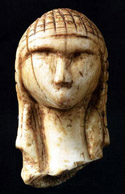Anthropology, Department of

Department of Anthropology: Faculty Publications
Document Type
Article
Date of this Version
1994
Abstract
We have three general conclusions to emphasize as well as an observation about aging in these [!Kung and Herero] societies that we believe deserves elaboration:
1. Old people are treated well in both these groups but not because they are scarce. Both the !Kung and the Herero are low-fertility populations so the proportion of the total population that is old is high in both groups.
2. Old people do not appreciate what appears to be the good (!Kung) and superb (Herero) social support that they receive. They have nothing good to say about being old. While we perceived very positive aspects of aging in these societies, members of these societies do not share our perceptions.
3. The social support that old people receive in these societies does not begin to compensate for the absence of comforts routinely available in highly developed societies such as furniture, running water, central heat, antibiotics, analgesics, eyeglasses, and dental prostheses. Old people were, by our standards, remarkably fit, active, and involved. However, they had no choice; they could not withdraw in the way that older people in wealthy industrial societies can.


Comments
Published in FUNCTIONAL PERFORMANCE IN OLDER ADULTS, edited by Bette Bonder & Marilyn Wagner (Philadelphia: F. A. Davis Company, 1994), pp. 15-27. Copyright 1994 F. A. Davis Company; copyright 2012 Patricia Draper & Henry Harpending. Used by permission.